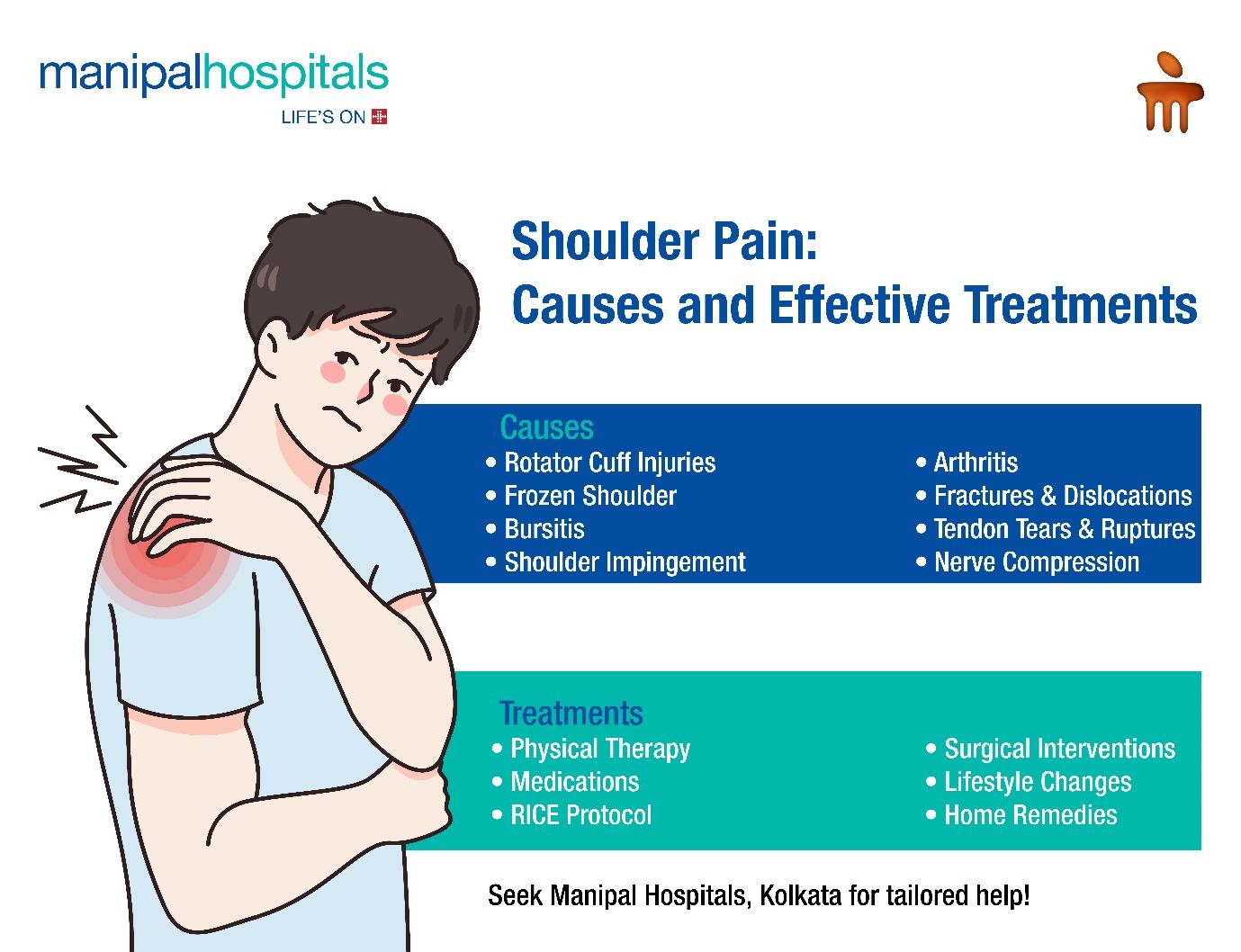
Shoulder pain is a common complaint that can significantly impact daily activities and overall quality of life, irrespective of age and gender. Whether it's a dull ache, a sharp twinge, or constant discomfort, shoulder pain can stem from various causes. The human shoulder has a wide and versatile range of motion. According to the top orthopedic doctor in Kolkata, an injured or frozen shoulder causes pain and discomfort, preventing you from moving freely. In this comprehensive guide, we'll delve into the underlying reasons behind shoulder pain, highlighting the primary causes and presenting a range of effective treatment options.
Causes of Shoulder Pain
-
Rotator Cuff Injuries
-
Rotator Cuff Tears: Partial or complete tears of the muscles and tendons that stabilise the shoulder joint.
-
Tendonitis: Inflammation of the rotator cuff tendons due to repetitive overhead motions.
-
Frozen Shoulder (Adhesive Capsulitis)
-
Gradual stiffening and tightening of the shoulder joint's capsule lead to reduced mobility and pain.
-
Bursitis
-
Inflammation of the bursa sac, a fluid-filled cushion that reduces friction between tendons and bones.
-
Shoulder Impingement Syndrome
-
Compression of tendons or bursa between the bones in the shoulder, causing pain during movement.
-
Arthritis
-
Osteoarthritis: Degeneration of joint cartilage over time, leading to pain and restricted movement.
-
Rheumatoid Arthritis: An autoimmune condition causing joint inflammation, including the shoulder.
-
Fractures and Dislocations
-
Fractured collarbone, humerus, or shoulder blade due to accidents or falls.
-
Dislocated shoulder: Displacement of the upper arm bone from the shoulder socket.
-
Tendon Tears and Ruptures
-
Biceps Tendon Tears: Occur when the long head of the biceps tendon becomes damaged.
-
Subscapularis Tendon Tears: Affect the muscle that helps rotate the arm.
-
Nerve Compression
-
Pinched nerves in the neck or shoulder region, leading to radiating pain down the arm.

Available Treatments for Shoulder Pain
1. Physical Therapy
-
A customised exercise program strengthens muscles, improves flexibility, and restores shoulder function; you can find the best orthopaedic hospital in Kolkata to help you with the same.
-
Highly effective for rotator cuff injuries, frozen shoulder, and impingement syndrome.
2. Medications
-
Nonsteroidal Anti-inflammatory drugs: Reduce pain and inflammation.
-
Analgesics: Over-the-counter pain relievers like acetaminophen.
-
Corticosteroid Injections: Provide rapid relief by reducing inflammation.
3. RICE Protocol
-
Rest: Giving the shoulder proper rest to allow healing.
-
Ice: Applying ice packs to reduce swelling and pain.
-
Compression: Using bandages to support the shoulder.
-
Elevation: Keeping the shoulder elevated to minimise swelling.
4. Surgical Interventions
-
Arthroscopy: Minimally invasive procedure to repair or remove damaged tissue in the shoulder joint.
-
Rotator Cuff Repair: Surgery to reattach torn tendons to the bone.
-
Joint Replacement: In severe cases of arthritis, replace the damaged joint with an artificial one.
5. Lifestyle Modifications
-
Avoiding activities that exacerbate the pain.
-
Maintaining good posture can help prevent further strain on the shoulder.
-
Using ergonomic equipment and techniques to minimise shoulder stress.
7. Home Remedies
-
Gentle stretching and range-of-motion exercises to prevent stiffness.
-
Local Ice packs to reduce pain and swelling.
Effectiveness of Treatments
-
Physical Therapy: Highly effective for most shoulder conditions, offering long-term relief and improved mobility.
-
Medications: Provide temporary relief and reduce inflammation, but may not address the root cause.
-
RICE Protocol: Effective for mild injuries and inflammation, promoting healing.
-
Surgical Interventions: Reserved for severe cases and often yield positive outcomes, though recovery time varies.
-
Lifestyle Modifications: Essential for preventing future shoulder issues and managing chronic pain.
-
Alternative Therapies: Some individuals find relief, but results can be variable.
-
Home Remedies: Helpful in managing mild pain and discomfort, but not a substitute for professional treatment.
Shoulder pain can arise from a multitude of causes, affecting people of all ages and lifestyles. From rotator cuff injuries to arthritis, understanding the underlying reasons is crucial for effective treatment. Depending on the severity of the condition, a combination of physical therapy, medications, surgical interventions, and lifestyle adjustments can provide much-needed relief. Early intervention and proper care can significantly enhance the chances of regaining pain-free shoulder function and improving the overall quality of life.
If you're experiencing persistent or worsening shoulder pain, you can consult a medical professional at Manipal Hospitals in Kolkata to determine the best course of action for your specific condition.



















 4 Min Read
4 Min Read
















